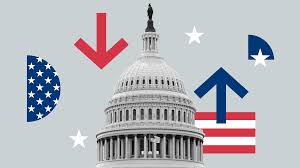As the 2024 U.S. presidential election draws nearer, many investors, business leaders, and analysts are pondering how the outcome will impact the broader economic landscape. Presidential elections often bring a degree of uncertainty, and with heightened political polarization, the stakes in this election are particularly high. Both the direction of economic policy and the broader political environment are poised to undergo significant changes, depending on who takes the White House.
While it’s difficult to predict the exact impact, certain issues—such as fiscal policy, taxes, regulations, and trade—will certainly play a major role in shaping markets and business strategies in the months and years ahead. Here’s a closer look at how the 2024 election could influence the economy and markets.
Market Volatility and Political Uncertainty
In the leadup to any presidential election, market volatility tends to increase as investors react to the uncertainty surrounding the potential outcome. In 2024, this uncertainty could be even more pronounced given the tight race and the broad ideological differences between the candidates. Historical trends show that stocks may experience shortterm fluctuations during election years, especially in the weeks leading up to Election Day.
The markets often react not just to who wins, but also to how close the race is, and any signals of political instability that could emerge in the process. If the election results are contested or the transition of power becomes contentious, the uncertainty could spill over into markets, affecting stock prices, bond yields, and foreign exchange rates.
However, some analysts argue that markets are generally adept at adjusting to electoral outcomes over time. In the longer term, market sentiment tends to stabilize once the election results are confirmed and the future policy landscape becomes clearer.
Fiscal and Tax Policy: The Battle for the Budget
One of the most significant issues that will affect markets and businesses is the direction of fiscal and tax policy under the new president. Both major political parties typically have starkly different views on how to manage government spending, taxation, and the budget deficit, which can influence corporate profits, consumer spending, and the overall economic environment.
- Tax Policies: The presidential candidates will likely present competing visions for taxes. If a Democratic candidate wins, there may be an emphasis on raising corporate tax rates and increasing taxes on highincome earners to fund government spending on programs like healthcare, social services, and infrastructure. On the other hand, a Republican victory could lead to tax cuts aimed at boosting business investment and consumer spending, with an emphasis on reducing corporate tax rates and lowering taxes for the wealthy.
- Government Spending: The approach to federal spending is also a key issue. A Democrat might push for expanded social welfare programs, while a Republican could focus on reducing government expenditures to curb the national deficit. Business sectors that rely heavily on government contracts (such as defense, healthcare, and infrastructure) will need to assess how spending priorities could shift under a new administration.
- Deficit and Debt: The federal deficit and national debt levels have become a significant concern in recent years. The direction of fiscal policy in the next administration could have longterm effects on inflation, interest rates, and government bond yields. Investors will be closely watching how the next president plans to tackle these issues and how that might affect their portfolios.
Regulations and Business Environment
Another critical area where the presidential election will impact markets is the regulatory environment. Each party has different approaches to regulations, which can influence entire industries, from healthcare to energy to technology.
- Environmental Regulations: Climate change and environmental regulations have become a prominent issue in recent elections, and this trend is expected to continue in 2024. If a Democratic candidate wins, we could see increased regulations on carbon emissions, renewable energy mandates, and restrictions on fossil fuel companies. For industries like oil, natural gas, and coal, this could lead to higher costs and slower growth. On the other hand, a Republican victory may see a rollback of environmental regulations, which could benefit energy companies but may result in criticism regarding climate change policies.
- Healthcare Regulations: Healthcare is another area where policies will vary dramatically based on the election’s outcome. A Democratic administration might push for further expansion of the Affordable Care Act (ACA) or even advocate for a public option, while Republicans are more likely to seek to reduce government intervention and support private healthcare initiatives. These differing approaches will have significant implications for healthcare providers, insurance companies, and related industries.
- Labor and Employment Laws: Labor regulations, including wage laws, union policies, and worker protections, will also be influenced by the election. If Democrats retain the White House, there may be a stronger push for policies that benefit workers, such as increasing the federal minimum wage and expanding labor union rights. In contrast, Republicans are likely to advocate for policies that promote a more businessfriendly labor market, including reducing regulations that they believe could inhibit job creation.
Trade and Global Economic Relations
The future of U.S. trade policy will also be at stake in the 2024 election. Trade has a significant impact on businesses, particularly those involved in exporting goods or sourcing products from overseas. The outcome of the election could shape U.S. relations with key trading partners such as China, Europe, and Mexico.
- Trade Tariffs and China: A contentious issue in recent years has been the trade war with China. A potential second term for the current president, or the election of a candidate with a hardline stance on China, could lead to more tariffs and trade restrictions. On the other hand, a different administration might seek to ease tensions and negotiate trade agreements aimed at reducing tariffs. These trade policy shifts will be closely watched by businesses in sectors like agriculture, technology, and manufacturing.
- Global Supply Chains: The 2024 election could also have ramifications for global supply chains. A president focused on protectionist policies may push for more domestic production and restrict overseas outsourcing, which could affect industries that rely on international supply chains, such as consumer electronics and apparel. Conversely, a more open trade approach might allow for smoother international trade but could also raise concerns about job outsourcing and the impact on domestic industries.
Investor Sentiment and Business Strategy
The election outcome will also influence overall investor sentiment, which in turn can affect corporate strategy. A perceived shift toward more probusiness policies, such as lower taxes and deregulation, could boost business confidence, leading to increased capital investment, stock buybacks, and hiring. Alternatively, if the election results in the expectation of higher taxes or stricter regulations, businesses may become more cautious in their approach, potentially leading to slower growth and less investment in expansion.
Conclusion: Navigating Election Year Uncertainty
The 2024 U.S. presidential election holds considerable weight for both the financial markets and business landscape. Whether it’s through tax policy, regulatory changes, trade relations, or fiscal spending, the outcome will shape the economic environment for years to come. As a result, businesses and investors alike should brace for a period of heightened uncertainty and prepare for the potential outcomes of the election.
While predicting the exact outcome and its economic ramifications is challenging, staying informed and proactive will be crucial. Diversifying investments, staying agile with business strategies, and understanding the potential risks and opportunities created by different policy scenarios will help navigate this critical election year successfully.



